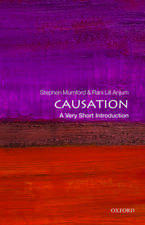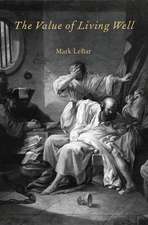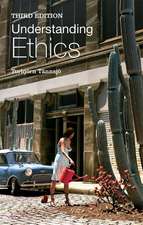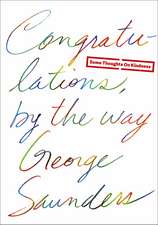Ethics: An Overview
Autor Professor Robin Attfielden Limba Engleză Paperback – 7 mar 2012
| Toate formatele și edițiile | Preț | Express |
|---|---|---|
| Paperback (1) | 252.01 lei 6-8 săpt. | |
| Bloomsbury Publishing – 7 mar 2012 | 252.01 lei 6-8 săpt. | |
| Hardback (1) | 1007.94 lei 6-8 săpt. | |
| Bloomsbury Publishing – 7 mar 2012 | 1007.94 lei 6-8 săpt. |
Preț: 252.01 lei
Preț vechi: 305.84 lei
-18% Nou
Puncte Express: 378
Preț estimativ în valută:
48.22€ • 50.49$ • 39.100£
48.22€ • 50.49$ • 39.100£
Carte tipărită la comandă
Livrare economică 10-24 aprilie
Preluare comenzi: 021 569.72.76
Specificații
ISBN-13: 9781441182050
ISBN-10: 1441182055
Pagini: 280
Dimensiuni: 156 x 234 x 18 mm
Greutate: 0.42 kg
Editura: Bloomsbury Publishing
Colecția Continuum
Locul publicării:London, United Kingdom
ISBN-10: 1441182055
Pagini: 280
Dimensiuni: 156 x 234 x 18 mm
Greutate: 0.42 kg
Editura: Bloomsbury Publishing
Colecția Continuum
Locul publicării:London, United Kingdom
Caracteristici
Applies ethics to contemporary issues such as climate change, the environment, development, population, poverty and war.
Notă biografică
Robin Attfield is Professor of Philosophy at Cardiff University, UK. He is the author of Creation, Evolution and Meaning (2006), Environmental Ethics: An Overview for the 21st Century (2003 and 2014), The Ethics of the Global Environment (1999 and 2015), Wonder, Value and God (2017) and Environmental Ethics: A Very Short Introduction (2018).
Cuprins
PrefaceAcknowledgementsList of Abbreviations1. History of EthicsAristotle on Eudaemonia and VirtueSome Themes from Hobbes and HumeSome Kantian ThemesJohn Stuart Mill's Utilitarianism2. Value-Theory and the Good LifePleasure, Happiness and FlourishingMoral Standing, Value and Intrinsic ValueWorthwhile Life, Self-Respect and Meaningful WorkThe Good Life, Needs, Virtue and Morality3. Normative EthicsMoral Standing, Value, Rights and RightnessConsequentialism and Its CriticsDeontology, Contractarianism and ConsequentialismVirtue EthicsPractice-Consequentialism and Virtue-Consequentialism4. Applied EthicsThe Re-emergence of Applied EthicsMedical EthicsAnimal EthicsDevelopment EthicsEnvironmental EthicsThe Ethics of War5. Meta-EthicsNon-cognitivism, Projectivism and Prescriptivism'Good', 'Ought' and MoralityCognitivism and RealismInternalism, Externalism and PracticalityNaturalism and Non-naturalism6. Free Will and ResponsibilityResponsibility, Character and DeterminismLaws of Nature, 'Ought' and 'Can'Evolution, Randomness, 'Could' and 'Would'The Future Is OpenIndex
Recenzii
What makes Ethics: An Overview accessible is its clear style, based on its author's long teaching experience, with technical terms explained as they arise. Every chapter is divided into a sequence of related topics, each accompanied by its own study questions, reading lists and references. A related website carries notes, background essays and a series of PowerPoint presentations, which could be useful for lecturers, tutors and student study-groups. The beginner is spared some of the grind of annotation, and so has more time for reflection, discussion and working out a personal response ... Every student and teacher of philosophy should consider buying this book.
Attfield's Ethics sets a high bar for introductory ethics students, providing detailed, nuanced treatments of its topics. In choosing those topics, Attfield was very clearly playing to his own strengths (nowhere is this more clear than in the refreshingly sophisticated chapter on applied ethics), but those strengths are wide-ranging enough that the book never feels like an excuse to explore the author's pet projects ... The text as a whole remains highly useful for its purpose.
Used together with the accompanying "companion website" it will prove invaluable, whether in the role of textbook or in ancillary reading ... Ethics: An Overview focuses on stimulating and ongoing de-bates, especially ones in applied ethics (ranging from medical ethics to the ethics of war and peace), and at the same time provides a good grounding in normative ethical principles and virtues, and in their status and basis. There again, it also offers suggestions for ways of taking study further, for example through the useful study questions and reading lists with which each of the twenty-eight sections is equipped. In other words, it encourages students to become their own philosophers ... instructors who deploy the resources of the companion website in their teaching, and in particular its powerpoint displays, will discover how the book's themes can be encapsulated in nuggets of illuminating prose, capable of grabbing the attention of students and inspiring them to studying the text and some of the suggested further reading. Taught in this way, even meta-ethics can come alive, and its importance be recognized ... the material presented in this book opens up new vistas into this often difficult and controversial subject.
In the reviewer's opinion, Attfield's work contains sufficient material to provide the core thesis for even an advanced course on these topics ... This book offers well-developed analyses of a variety of relevant topics and provides a good overview of the field of ethics. It can be recommended to all those who are committed to ethics, both students and teachers alike. It can be used to briefly refresh the memory on certain topics, or as a brief introduction to an as yet unconsidered area.
An uncommonly clear, fair-minded and up-to-date survey of this vast and contentious field. Attfield is particularly good about Evolution.
Robin Attfield's Ethics is one of the most comprehensive overviews of the discipline: It discusses the history of ethics, value theory and normative concepts, issues of applied ethics, such as animal ethics and just war theory, the metaethical issues of the status of normative propositions, and the problem of free will. The intellectual and moral thoughtfulness so characteristic of Attfield's work make his book one of the best introductions for all those who expect from ethics both conceptual analyses and concrete answers to the question: What is right?
This is an admirable up-to-date introduction to the main fields of ethics, including meta-ethics and applied ethics. The way Attfield presents his material reveals long-standing teaching experience and makes the book especially suitable for beginners. Though taking a firm stance on the more controversial topics of ethics (rather then indulging in mere "option presentation") Attfield consistently avoids being magisterial. Instead, the reader is invited to think things through for himself and to come to his own conclusions.
This concise overview of key modern thinkers, although limited to the field of Ethics, would have been an invaluable aid for me when I was an undergraduate at Cambridge, doing some work on ancient Greek philosophy, and also with work on modern philosophy at London University. At Cambridge detailed study of the original Greek texts left little time for considerations of their contributions towards later thought, or their continuing relevance. If you merely struggle with alien concepts from ancient times, without a proper awareness of their contemporary value, the studies can seem rather pointless at times. Moreover, if you are trying to grasp ethical concepts, whether ancient or modern, you really need the brief, concise summaries Attfield provides, to distinguish the wood from the trees, and show clear lines of development in successive thinkers. For such early philosophers as Democritus, Aristotle, Stoics and Epicureans, through to subsequent modern philosophers up to the present day, I wish I had had his book to help me. Even now (forty years on), reading extracts from it has shown me how such brief and concise outlines of ethical thinking can open up whole vistas towards understanding and appreciating philosophical thinkers in general.
The section on Aristotle does an excellent job of conveying essentials clearly and attractively.
Attfield's Ethics sets a high bar for introductory ethics students, providing detailed, nuanced treatments of its topics. In choosing those topics, Attfield was very clearly playing to his own strengths (nowhere is this more clear than in the refreshingly sophisticated chapter on applied ethics), but those strengths are wide-ranging enough that the book never feels like an excuse to explore the author's pet projects ... The text as a whole remains highly useful for its purpose.
Used together with the accompanying "companion website" it will prove invaluable, whether in the role of textbook or in ancillary reading ... Ethics: An Overview focuses on stimulating and ongoing de-bates, especially ones in applied ethics (ranging from medical ethics to the ethics of war and peace), and at the same time provides a good grounding in normative ethical principles and virtues, and in their status and basis. There again, it also offers suggestions for ways of taking study further, for example through the useful study questions and reading lists with which each of the twenty-eight sections is equipped. In other words, it encourages students to become their own philosophers ... instructors who deploy the resources of the companion website in their teaching, and in particular its powerpoint displays, will discover how the book's themes can be encapsulated in nuggets of illuminating prose, capable of grabbing the attention of students and inspiring them to studying the text and some of the suggested further reading. Taught in this way, even meta-ethics can come alive, and its importance be recognized ... the material presented in this book opens up new vistas into this often difficult and controversial subject.
In the reviewer's opinion, Attfield's work contains sufficient material to provide the core thesis for even an advanced course on these topics ... This book offers well-developed analyses of a variety of relevant topics and provides a good overview of the field of ethics. It can be recommended to all those who are committed to ethics, both students and teachers alike. It can be used to briefly refresh the memory on certain topics, or as a brief introduction to an as yet unconsidered area.
An uncommonly clear, fair-minded and up-to-date survey of this vast and contentious field. Attfield is particularly good about Evolution.
Robin Attfield's Ethics is one of the most comprehensive overviews of the discipline: It discusses the history of ethics, value theory and normative concepts, issues of applied ethics, such as animal ethics and just war theory, the metaethical issues of the status of normative propositions, and the problem of free will. The intellectual and moral thoughtfulness so characteristic of Attfield's work make his book one of the best introductions for all those who expect from ethics both conceptual analyses and concrete answers to the question: What is right?
This is an admirable up-to-date introduction to the main fields of ethics, including meta-ethics and applied ethics. The way Attfield presents his material reveals long-standing teaching experience and makes the book especially suitable for beginners. Though taking a firm stance on the more controversial topics of ethics (rather then indulging in mere "option presentation") Attfield consistently avoids being magisterial. Instead, the reader is invited to think things through for himself and to come to his own conclusions.
This concise overview of key modern thinkers, although limited to the field of Ethics, would have been an invaluable aid for me when I was an undergraduate at Cambridge, doing some work on ancient Greek philosophy, and also with work on modern philosophy at London University. At Cambridge detailed study of the original Greek texts left little time for considerations of their contributions towards later thought, or their continuing relevance. If you merely struggle with alien concepts from ancient times, without a proper awareness of their contemporary value, the studies can seem rather pointless at times. Moreover, if you are trying to grasp ethical concepts, whether ancient or modern, you really need the brief, concise summaries Attfield provides, to distinguish the wood from the trees, and show clear lines of development in successive thinkers. For such early philosophers as Democritus, Aristotle, Stoics and Epicureans, through to subsequent modern philosophers up to the present day, I wish I had had his book to help me. Even now (forty years on), reading extracts from it has shown me how such brief and concise outlines of ethical thinking can open up whole vistas towards understanding and appreciating philosophical thinkers in general.
The section on Aristotle does an excellent job of conveying essentials clearly and attractively.
















